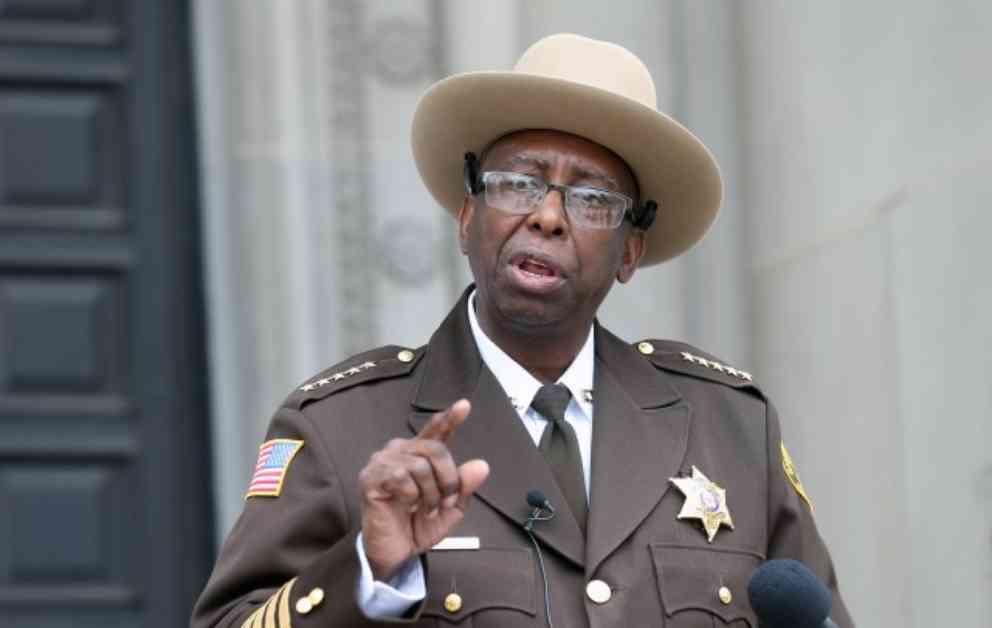St. Louis City Sheriff Vernon Betts has made headlines recently after requesting a recount in the primary election results where he narrowly lost to challenger Alfred Montgomery. The St. Louis Board of Election Commissioners released the official results from the August 6, 2024 primary election, revealing that Betts received 22,604 votes while Montgomery received 22,860 votes, a difference of less than 300 votes. With Montgomery holding a slim 0.56% lead over Betts, the sheriff filed a petition with the St. Louis Circuit Court, citing Missouri Statute 115.601 which allows for a recount in cases where the margin of victory is less than one percent of the total votes cast.
This move by Betts has sparked controversy and uncertainty in the St. Louis political landscape, with many questioning the validity of the election results and the impact of a potential recount on the outcome. While Betts has been in office since 2017 and has a track record of success, the close margin of victory in this election has raised doubts about the fairness and accuracy of the voting process.
The Legal Basis for a Recount
The decision to request a recount was based on Missouri state laws that afford candidates the right to challenge election results in cases where the margin of victory is less than one percent. Missouri Statute 115.601 specifically states that “Any contestant in a primary or other election contest who was defeated by less than one percent of the votes cast for the office shall have the right to a recount of the votes cast for the office or on the question.”
Betts’s petition to the St. Louis Circuit Court outlined his argument for a recount based on this statute, highlighting the close margin between him and Montgomery as grounds for further investigation into the election results. By invoking this legal provision, Betts is exercising his right as a candidate to ensure that the electoral process is fair and transparent.
Reactions and Responses
The news of Betts’s recount request has elicited mixed reactions from the public and the political community in St. Louis. Supporters of Betts have expressed their belief in the need for a recount to verify the accuracy of the election results and to ensure that every vote is counted correctly. They argue that the slim margin of victory warrants further scrutiny and that Betts is well within his rights to seek a recount under Missouri law.
On the other hand, critics of Betts’s decision have raised concerns about the potential delays and costs associated with a recount, as well as the impact on the overall integrity of the electoral process. They argue that the election results have already been certified and that a recount could sow confusion and doubt among voters. Some have accused Betts of being a sore loser and attempting to overturn the will of the voters.
In response to these criticisms, Betts has maintained that his primary goal is to ensure the fairness and accuracy of the election results. He has emphasized the importance of upholding democratic principles and respecting the rights of all candidates to challenge the outcome of an election. Betts has expressed confidence in the legal process and the ability of the St. Louis Circuit Court to conduct a thorough and impartial recount.
The Impact of the Recount
The decision to pursue a recount in the St. Louis City Sheriff primary election has raised questions about the potential impact on the local political landscape. If the recount results in a reversal of the initial outcome and Betts is declared the winner, it could have far-reaching consequences for both candidates and the broader community.
For Betts, a successful recount would not only vindicate his decision to challenge the election results but also reaffirm his position as the legitimate incumbent sheriff. It would demonstrate his commitment to upholding the rule of law and ensuring the integrity of the electoral process. Additionally, a recount victory could boost Betts’s credibility and support among voters, solidifying his position as a key figure in St. Louis politics.
On the other hand, a recount that confirms Montgomery’s victory would validate the initial election results and solidify his position as the new St. Louis City Sheriff. It would affirm the will of the voters and provide a clear mandate for Montgomery to lead the sheriff’s office. However, it could also raise questions about the reliability of the initial results and the potential for errors in the voting process.
Overall, the impact of the recount will depend on the outcome and the manner in which it is conducted. Regardless of the result, the recount process will shed light on the strengths and weaknesses of the electoral system in St. Louis and provide valuable insights for future elections.
In conclusion, the request for a recount in the St. Louis City Sheriff primary election has generated controversy and uncertainty in the local political arena. As the legal process unfolds and the recount takes place, all eyes will be on the St. Louis Circuit Court to ensure a fair and transparent resolution to this closely contested race. The outcome of the recount will not only determine the next St. Louis City Sheriff but also shape the future of electoral politics in the city.


